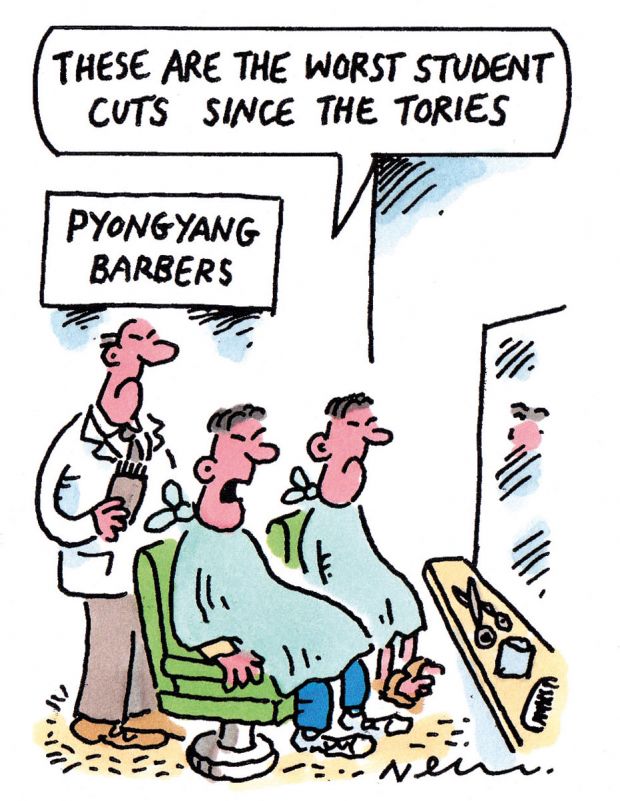
- Labour is to slash maximum tuition fees to £6,000 a year and may reduce them to as little as £4,000, The Sunday Times reported on 30 March. Ed Miliband, the party’s leader, is expected to pledge to cut the £9,000 maximum to £6,000 before the autumn conference season, but he may unveil even more radical measures, the paper said. He is said to be examining a complete overhaul of tuition fees, in which each student would receive a voucher-style “entitlement” of £15,000 to use at any university. Institutions would also be able to charge fees of up to £4,000 a year to cover teaching costs. According to David Willetts, the universities and science minister, cutting annual fees by £3,000 would create a “black hole of £3 billion a year”.
- Nick Hillman, director of the Higher Education Policy Institute, has shone a light on to his previous role as special adviser to David Willetts. A paper by Mr Hillman for the Institute for Government, “In Defence of Special Advisers: Lessons from Personal Experience”, was published on 28 March. “One mistake I made was not keeping Number 10 sufficiently well informed on the appointment of a new head for the Office of Fair Access. A political row ensued,” Mr Hillman says of events surrounding the appointment of Les Ebdon in 2012. He also says that despite Mr Willetts’ clear policy goals, private providers were “largely off the departmental radar to begin with”. Despite making clear that the regulatory system needed attention, when Mr Hillman invited departmental officials to join his meetings with private providers he was “initially told that there were insufficient resources to spare”. Is this the reason uncontrolled public-backed funding at private providers will hit £1 billion next year, or a case of let’s blame Sir Humphrey?
- Kim Jong-Un took the idea of a “must-have” haircut to a new level after he decreed that all male students must sport his own distinctive barnet, the Daily Mail reported on 26 March. About two weeks ago, North Korea’s government announced that the only hairstyle allowed on campus would be the Dear Leader’s distinctive ’do, which the paper described as a “shaved undercut and floppy curtains”. The style, favoured by several mid-1990s boy bands, is unpopular with many as it is commonly associated with Chinese smugglers, one source said. Having previously advocated strict short back and sides in a 2005 television broadcast titled “Let us trim our hair in accordance with Socialist lifestyle”, one can only wonder what the regime would make of some of the hirsute hipster students at UK universities.
- Two female University College London academics incensed by a Daily Mail column’s suggestion that it was only their gender and race that won them invitations to discuss the Big Bang on Newsnight may have achieved the nearest they will get to a climbdown. On 28 March, the Mail posted a brief clarification stating that it had “wrongly” said a breakthrough study on the Big Bang “was compiled by white, male, American scientists”. “We are happy to clarify that the study…was conducted by a diverse team of astronomers from around the world and we apologise for any suggestion to the contrary.” But there was no retraction of the suggestion from gossip columnist Ephraim Hardcastle that “giggling Sky at Night presenter Maggie Aderin-Pocock and Sri Lanka-born astronomer Hiranya Peiris” were invited on to the show because the editor was “keen on diversity”.
- Has graphene inventor Sir Andre Geim let the cat out of the bag regarding professors’ dismissive attitudes to undergraduate teaching? On BBC Radio 4’s Desert Island Discs on 30 March, the Nobel prizewinning Regius professor of physics at the University of Manchester admitted: “I don’t like students very much. They come absolutely ignorant, and they are not grown up yet as interesting people.” Professor Geim said it was only after two or three years of a PhD that young scientists began to interest him. “After that we become not like a professor and a student, we become like colleagues and we do research as colleagues and that is a really enjoyable experience.” Perhaps he missed the memo reminding professors to emphasise that teaching is, of course, valued as equally as research, by all staff.
